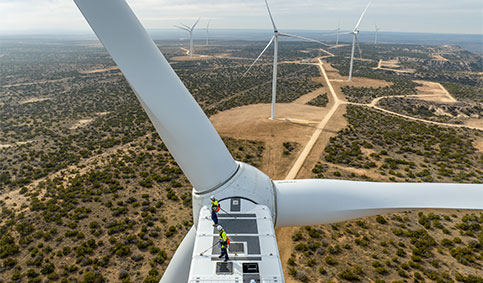Power
Policies which increase the supply of renewable power, and incentivise its demand, will play a crucial role in helping our customers decarbonise. Our focus on value has led to a strategic shift in our power business towards select markets such as Australia, Europe, India and the USA. In 2023 our advocacy focused on market design, permitting reform, and incentives to grow the supply of and demand for low-carbon and renewable power.
In 2023, in Australia we engaged with the government on the capacity investment scheme for the national electricity market, which aims to increase the amount of renewable energy available in the grid when it is needed.[1] We also responded to the government consultation on legislative changes to incorporate an emissions reduction objective into national energy objectives.
The EU adopted the Renewable Energy Directive (RED) in October 2023. We supported the proposals in the RED to increase the EU’s 2030 renewable energy target, as well as binding mandates for the use of renewable hydrogen and advanced biofuels in industry and transport.[2] We welcomed the REPowerEU plan, including proposals to accelerate the deployment of renewable power through fast-tracked permitting, investments in cross-border grids and the removal of barriers to Power Purchase Agreements (PPAs). In 2023, we responded to the consultation on the revision of the EU’s electricity market design and supported the proposal to revise it. We believe these changes will stimulate investment in renewable energy by maintaining merchant price signals and ensuring support schemes can be combined with merchant routes.[3]
In the USA, we advocated the implementation of the wind and solar tax credits under the Inflation Reduction Act (IRA), and the modernisation and expansion of the power grid through the Infrastructure Investment and Jobs Act (IIJA). We also advocated for permitting reform, to enable large projects to be granted faster and with fewer hurdles. In response to the Environmental Protection Agency’s proposed draft rules for decarbonising the power sector,[4] our advocacy has focused on developing a workable rule that facilitates sufficient private sector investments in low-carbon solutions.
We provide more detail about our advocacy on some of these topics on our website.[5]

[1] www.shell.com/external-redirects/aus-2023-eight-shell-submission-capacity-investment-scheme
[2] Advocacy examples include www.shell.com/external-redirects/shells-paper-on-sectoral-decarbonisation-under-the-eu-fit-for-55-july-2022, x.com/Shell_EUAffairs/status/1641019757603201024?s=03 and x.com/Shell_EUAffairs/status/1641495420885950465?s=03
[4] Power sector regulation: New Source Performance Standard (NSPS) for greenhouse gas emissions from new, modified and reconstructed fossil fuel-fired electric generating units (EGUs).
[5] www.shell.com/sustainability/transparency-and-sustainability-reporting/advocacy-and-political-activity/climate-and-energy-transition-advocacy-updates.html. We also provide further information about renewable power on our website: www.shell.com/what-we-do/renewable-power.html









